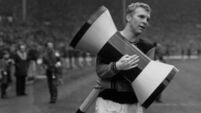Why is managing so difficult for many elite players?

Martin O'Neill with assistant Roy Keane in 2018 during their spell in charge of the Republic of Ireland. Keane is one of several big name players who had difficulty transferring his skill as a player to that of the role of manager. Picture: INPHO/Morgan Treacy
The podcast market is a saturated one at present, but The Overlap has struck a chord with many listeners.
The main characters – Gary Neville, Jill Scott, Roy Keane, Ian Wright and Jamie Carragher – have a good chemistry and offer interesting takes on the burning issues in football, as well as providing compelling insights into their own playing and managerial careers.
The latter is particularly pertinent off the back of the guest appearance of former Republic of Ireland manager Martin O’Neill on last week’s episode.
A major character in the game for over 50 years (he broke into the first team at Nottingham Forest in 1971), O’Neill has always displayed a real sense of confidence in himself as both a player and a manager. His achievements show this is justified, with two European Cup medals and a league title with Forest the pinnacle.
His managerial career flourished at club level, with his productive stint at Celtic particularly eye-catching, but his five-year spell as Ireland boss was also up there. The win over Italy at Euro 2016 will forever remain etched in the nation’s football psyche.
Most interesting from his podcast appearance last week, however, was Roy Keane’s revelation that his term as O’Neill’s assistant with Ireland was the highlight of his career. One must remember this is coming from someone who has seven Premier League medals and was one of the leading players in the world for the guts of a decade.
Keane’s preference to state that time as one of his favourite periods in football raises the question about the ability of genuine world class players to make the transition to management, given he enjoyed time as number one at two clubs prior to his decision to join the Irish set-up. One would have imagined a personality like Keane would relish being the main man, but clearly that isn’t the case.
Keane’s foray into the world of management started with a bang at Sunderland, where he helped the club achieve promotion to the Premier League. His time at Ipswich Town, between 2009 and 2011, never generated the same momentum.
The fact that Keane regards his time with Ireland – as assistant manager – as a career highlight perhaps points to someone who wasn’t quite suited to being the main man.
As manager, everything falls on your lap and the criticism is intense, especially when the person in question has a profile and reputation as big as Keane’s.
He seems to have found his niche now as an analyst, with his combative and direct style absolutely perfect for an era in which clicks and views have become such an important part of the mainstream media. Keane is made for it.
The question is, though, why did Keane’s undoubted leadership skills as a player not transfer to management?
Many of the Manchester United team of that era in the 1990s and into the noughties will talk about his ability to command the attention of the dressing room, even without saying a whole lot. He led through his actions, as opposed to words. Therein, perhaps, lies the difference between playing and management for Keane.
The main protagonist on The Overlap podcast – and on a lot of stuff now it feels – is Gary Neville.
A stalwart for Manchester United, he was a solid if unspectacular defender but was wholly reliable and a mainstay of the team during the Ferguson era at Old Trafford. Neville succeeded Keane as United captain in 2005. Yet, he too struggled when thrust into the managerial arena. Again, like Keane, he wasn’t propelled into an easy role, taking on the Valencia job to much surprise in December 2015 following his first entrance into the coaching arena with Roy Hodgson and the England national team.
The result? Neville’s stint in Spain was a shambles for the most part.
He lasted just four months and started the gig with a winless run in La Liga lasting nine games. Language barriers aside, it was clear it wasn’t his forté and he hasn’t dipped his toe back into the managerial game since, instead focusing on a flourishing media career which has turned him into the main voice on the game in the UK.
As an England international through the noughties, Neville was part of what was often considered as a golden generation of players touted for success. It never materialised. Beckham, Gerrard, Lampard and Rooney are some of the players involved in that era, and the squad was littered with world class talent, yet no one has been able to become a success in management.
Steven Gerrard threatened to become a manager of note with his initial success at Rangers but his stock plummeted with a poor spell in charge of Aston Villa. Now, he’s in Saudi Arabia where he’s rolling in the cash, but well out of the managerial limelight. It’s unlikely he’ll manage again in the Premier League.
Lampard has, somewhat unfairly, become the butt of many jokes as a manager. He failed to excel during his time with Chelsea, after a reasonable start with Derby County, and very nearly guided Everton to relegation. He’s now in charge at Coventry City, who sit mid table in the Championship.
Rooney is, perhaps, the best example of a big-time player who hasn’t been able to cut it on the touchline. A very popular figure in the English game, Rooney was just last week cut loose at Plymouth Argyle, with the club rooted to the bottom of the Championship table. This follows his brief and calamitous period as Birmingham manager last year when his controversial appointment, with the club sixth at that stage in the Championship, resulted in the club sliding all the way down to 20th place by the time he was sacked less than three months after taking the gig.
It goes to show that being on the outside of the white line, as opposed to inside, isn’t for everyone. Big names don’t necessarily equal success.





